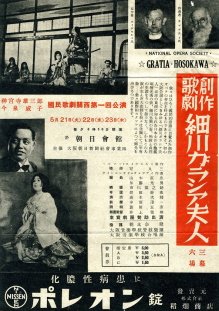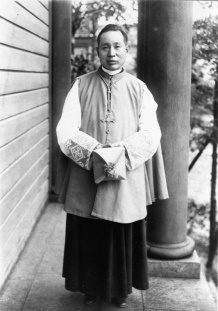The year 1940
The year 1940 was one that Father Cimatti will remember for the rest of his life because of three events.
These are "2,600th anniversary of the founding of the Empire of Japan, composition of the opera Hosokawa Gracia,
and release of Miyazaki pastoral district responsibility."
Commemorating the "Birth of an Empire"
Regarding the commemoration of the "Beginning of the Empire," Father Cimatti wrote the following words:
"According to myth, the first ancestor of the Emperor of Japan descended from the gods to this world in Miyazaki Prefecture
and set out on a journey to conquer all of Japan. The 2,600th anniversary is a time to celebrate and remember this.
It may seem strange, but the visit of the gods can be seen at the beginning of Japanese history.
Looking back at the history from then until now, Japan has been blessed with many things: national unification, the establishment of a constitution,
freedom of life, a unique spirit, the ability to accept what they need from overseas, and above all, a mission from God.
It is only natural that they should celebrate and be grateful for these blessings."
With this in mind, when Japan's NHK radio station asked him to compose a piano sonata to commemorate the event, he not only readily agreed, but also performed it himself.
It was broadcast nationwide from Miyazaki Broadcasting Station on January 3, 1940. This sonata consists of three parts.
"The Descent of the Gods upon the Leaders of Japan - The Coronation of Emperor Jimmu, the First Emperor to Travel Over the Sea to Unify Japan."
The sonata, interspersed with repetitive melodies from ancient Japan, was a great success, and Father Cimatti performed it not only in Miyazaki,
but also in Fukuoka, Nagasaki, and Tokyo.
Opera "Hosokawa Gracia"
In the same year, he accepted a request to add music to a play about a historical Christian figure called "Hosokawa Gracia" and turn it into an "opera."
At that time, Father Cimatti was well known as a musician, having given various concerts all over Japan.
The play was written by Heyman Huber, a Jesuit priest who was president of Sophia University in Tokyo.
Father Cimatti was asked to compose the music, and with the addition of an orchestra, it was performed at Hibiya Hall in Tokyo on January 24th of that year.
This opera captured the interest and appreciation of the Japanese people and was repeatedly performed in many parts of the country.
Father Cimatti did everything he could to point the Japanese people to God.
The position of Parish Rector of Miyazaki Diocese is handed over to a Japanese person
Up until this time, Father Cimatti always wore a black cassock whenever he appeared in public, no matter what he did.
However, towards the end of 1940, the Japanese government began issuing several appointment orders to foreign missionaries.
"The order was to make Sutan Clergyman, to hand over responsibility to foreign missionaries in responsible positions to Japanese people,
to refrain from seeking assistance from abroad for Catholic institutions in Japan, and to avoid bringing shame to Japan."
Father Cimatti, always one to follow the instructions of the state, not only immediately adapted himself to these instructions,
but also required the same of the priests under his jurisdiction.
Then, in contact with Salesian headquarters and his superiors in the Vatican, he set an example and was the first of the foreign dioceses working in Japan
to hand over the responsibility of the Diocese of Miyazaki to a Japanese on October 16, 1940.
His words were, "I will do anything for the good future of the Church in Japan."
Cimatti Museum Father Marsilio
January 6, 2023
Go to the index page of Father Cimatti's life
|

